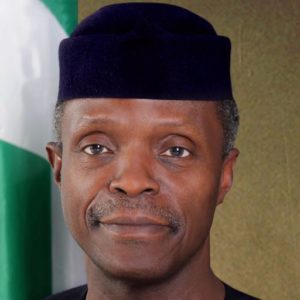 The Federal Government is putting things in place to move Nigeria from a ranking of 169 out of 189 countries in the World Bank ease of doing business to at least 20 spaces in the coming ranking.
The Federal Government is putting things in place to move Nigeria from a ranking of 169 out of 189 countries in the World Bank ease of doing business to at least 20 spaces in the coming ranking.
Vice President, Yemi Osinbajo who stated this yesterday in Abuja, said the Federal Government is focused on making it easier to do business in Nigeria.
Osinbajo made the statement in Abuja at the the International Mining Investment Conference/Exhibition on Nigeria with Connecting the Global Mining Industry to the Opportunities of the Solid Minerals Sector in Nigeria as theme.
Represented by the Special Adviser, Economic Office, Adeyemi Dipeolu, the Vice President said: “We are seeking to cooperate with our partners in the solid minerals sector to come up with a strategy for ensuring that it plays it’s desired role as a major economic sector in Nigeria.
“Budgetary provisions for the Ministry of Solid Minerals Development allotment this year is far larger than the allocation that the ministry has had in the past five years.
“Let me assure local and foreign investors that in our quest to grow this sector, the Federal Government is fully focused on making it easier to do business in Nigeria. As a metrix, we are planning and taking actions already on trying to move Nigeria from a ranking of 169 out of 189 countries in the World Bank ease of doing business to at least 20 spaces better in the coming ranking, we do hope by this gesture, governments efforts will be reciprocated by the respect for the rule of law and commitment to promoting the development of this country including the payment of taxes as required.”
Minister of Solid Minerals Development, Dr. Kayode Fayemi said the country can generate N5 trillion yearly from mining and exporting of its vast minerals deposits with multiplier effects on job creation, state development and social infrastructure.
He added that last year, the solid minerals sector contributed 0.33 per cent to the Gross Domestic Product (GDP) of the country and the sector hopes to contribute between five and seven per cent over the next 10 to 15 years.
“Today, based on current data, Nigeria’s solid minerals sector only makes up about 0.34 per cent of GDP; while that is significant, it is much smaller than its true potential as the vast majority of our mining assets have yet to be exploited.
“According to one of the major stakeholders in the solid minerals sector, the Association of Metal Exporters of Nigeria, we can generate at least N5 trillion annually from mining and exporting of its vast solid mineral deposits, with several multiplier effects on job creation, state development and social infrastructure that could position the solid minerals sector as the main catalyst for national development.
“Ancillary requirements for the proper functioning of the minerals and mining ecosystem such as infrastructure – e.g. railroad, competitive financing systems, mine and asset security, and related support services – are missing. We need changes in legislation – e.g. the passage of an amendment to the Nigeria Railways Corporation Act to break NRC’s monopoly and enable miners to set up private transport networks to move bulk minerals around the country for processing.







